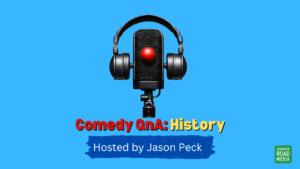Diane DiRestan from the “Business Presentations” blog wrote an article on dealing with hecklers and difficult audiences. I wanted to reference her blog as well as recount my own experiences on the same topic.
Diane outlines a 3-point strategy for dealing with this type of situatuation: depersonalize, detach, and defuse. Check out her blog for further details. I think she’s absolutely right with her assessment. However, it’s sometimes difficult not to go head-to-head with a heckler and, as a result, set up a competitive dynamic. Although, if it can be avoided, then it absolutely should!
But the very fact that an audience member has heckled immediately makes the situation confrontational and fills the room full of tension which, as a speaker, you have to deal with. As Diane rightly says, if that happens and you can diffuse it with humour then so much the better.
I personally think you need to be able to find a way to end the exchange before it gets out of hand. The best way forward initially is to try and ignore the heckle, especially if it’s in a large audience. People don’t always hear the comment and it may just be you. Therefore if you launch into a vitrolic attack, you may come across as the “baddie” as you have seemingly attacked an innocent party.
But that’s not always possible, as sometimes a section of the audience hears the heckle. Not everyone always hears the heckle, but even so a lot of times the rest of the audience knows that someone has said something. In this situation, I think that if the heckler’s dealt with in a firm, but humorous way and you re-gain the audience’s attention then you can move on.
I was speaking at a charity gig once and had a similar experience. A drunken audience member commented during my speech, I acknowledged what he said, he shut up and I moved on. I actually can’t remember if I got a laugh or not, but the very fact that I was on the ball and acknowledged the situation meant that I was capable of dealing with the situation even if it got out of hand. I asserted my authority.
Whereas the speaker who followed me wasn’t quite so lucky…
He just stayed there and slugged it out with the heckler and continued with his speech. Not only did the heckler get more instense with his vitriol, but other audience members joined in, initially to shout the heckler down.
Then the speaker’s suporters turned on the speaker when it became apparent that he couldn’t read an audience and his speech seemed overly complicated. I felt he should have cut his losses, realised the audience was beginning to turn against him and wound up his speech. Instead he carried on for 20 minutes after being heckled about 7 minutes in.
What to do in that sort of situation? I think that if a heckler “takes hold” and there’s nothing you can do to stop their torrent of abuse and disturbance of your speech then two things have to happen a) you cut your speech short and leave the platform b) the heckler gets ejected.
There are not always people mon hand to eject a heckler in this sort of situation.To my knowledge it’s still common practise in the Jongleurs comedy club chain. But speaking is an entriely different animal. Due to the gladitorial nature of stand-up you expect to be heckled. Not so with speaking.
I think in the above story, the speaker should have realised that his speech was going down like a lead balloon. He wasn’t attempting to entertain the audience; a fatal mistake. I think there has to be a certain amount of entertainment, especially if you’re speaking after dinner and people have drunk some alcohol.
Sometimes losing an audience’s attention is obvious. If people begin quietly chatting amongst themselves, generally it’s you that has made them lose interest. So you need to cut it short and go. Other times, it’s subtle; especially if the audience is sober.
I was in an audience recently at a Toastmasters club watching a 15-minute keynote speech and at a certain point at least 50% of the audience shifted in their seats at the same time! It was a weird experience, especially as I was one of the ones that moved. But when all those people moved together it was like it was rehearsed.
In that sort of a situation I think it becomes necessary to re-capture a restless audience’s attention. This is something that I have mentioned before. Those are the sorts of things that need to be kept an eye on when you’re speaking. Sometimes the audience getting restless or uncomfortable might not be because of the speaker. It could be the environment or something else beyond the speaker’s control.
The thing is to notice that type of situation and “head them off at the pass”, find a way to re-gain their attention before it gets worse and they turn into hecklers. Perhaps the above mentioned speaker could’ve employed The Hancock Manoeuvre?




1 ping
[…] Jason Peck shares his experience and advice for dealing with difficult audiences […]